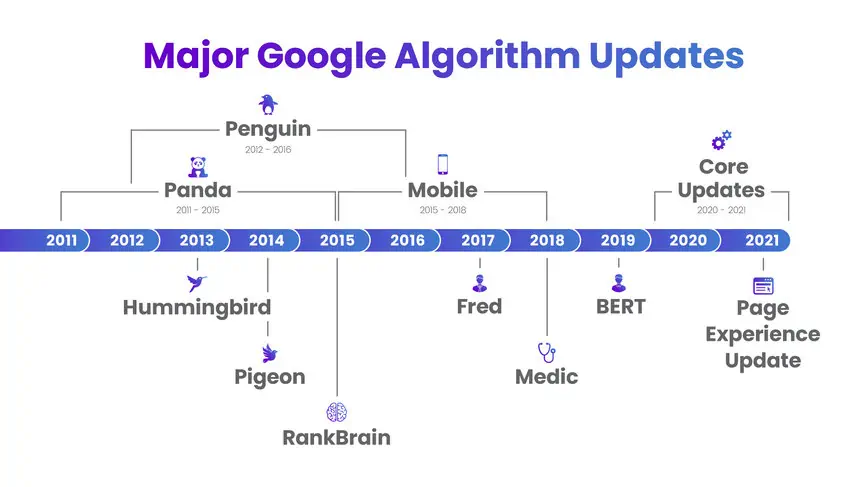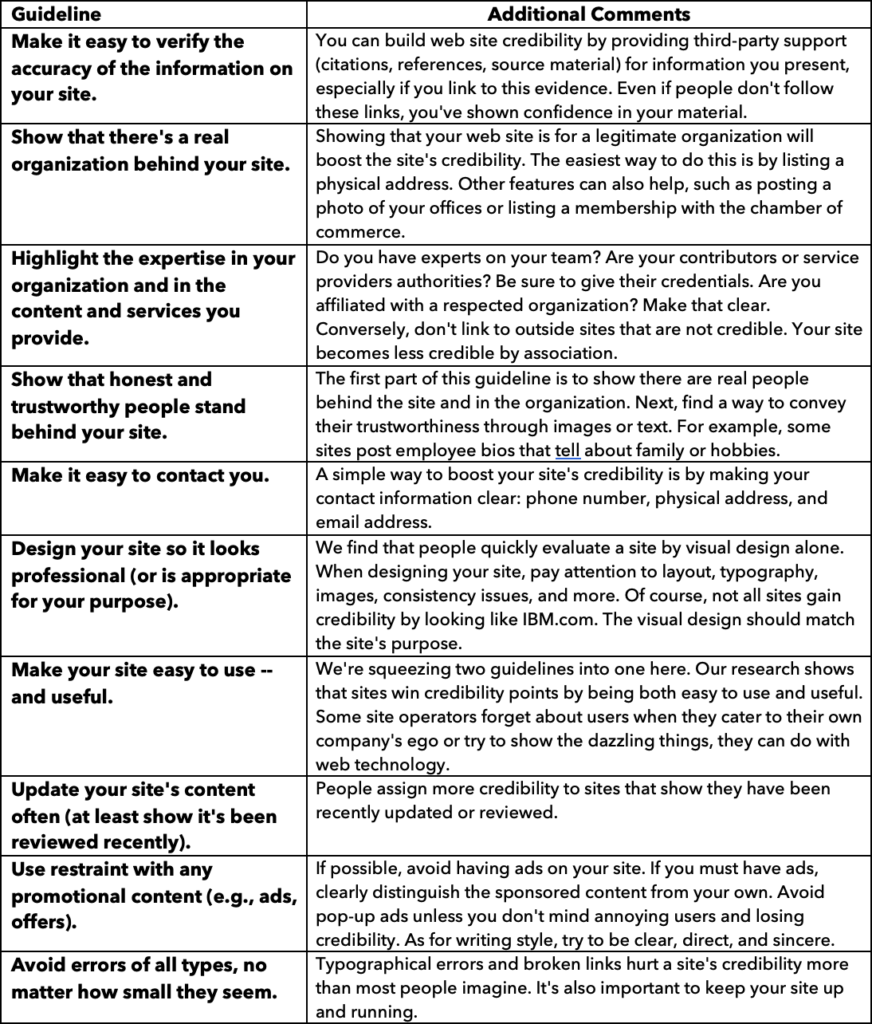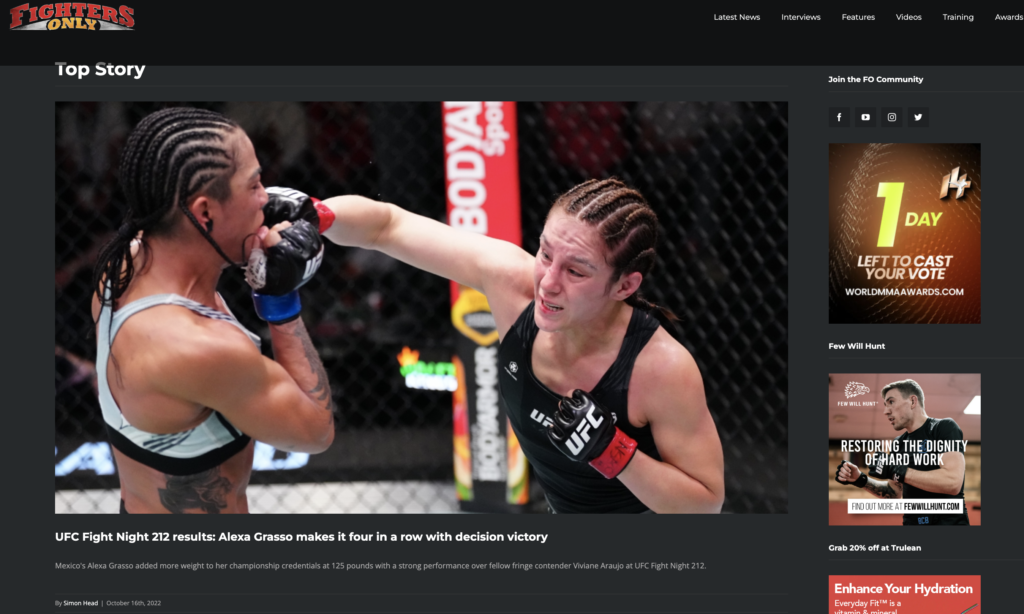It’s rare these days to see a brand getting drastically affected by a Google update, like what we saw in the 2011 – 2014 era of “animal” updates. It’s now more common that you’ll see a brand either dipping in visibility when an update happens or the opposite and seeing visibility improvements. Typically, any dips will continue to snowball after core updates.
For brands who are consistently losing visibility, it’s likely more to do with the strategic direction of your marketing than any one particular issue.
SEO principles have been the same for 20 years. The change centres around one thing: how algorithms have gotten better at understanding what makes web experiences useful to users.

Playing Ball With Googles Utopian Vision
In Google’s eyes, pivoting strategies to match updates means you’re not playing ball with their guidelines on how best to run your site in terms of user experience. Of course, the technical set up of your site is important too. However, drops after algorithm updates are generally user-focused and about what’s visible at face value on your site.
If your brand is suffering hits every month on account of core algorithm updates and smaller updates, it’s worth getting an SEO agency to run a holistic audit of your strategy and brand in general.
Lots of SEO audits will focus on Ahrefs reports etc. and relay back, ‘Oh, you’ve got these broken links and you’ve got this and that.’ They can be useful at the right time, but if you’re consistently seeing drops in visibility, take it as the canary in the coal mine that something is wrong at a wider level.
SEO Has Been The Same For 20 Years +
Check out this table of Guidelines for Web Credibility produced by Stanford in June 2002:

Much, if not all of the above guidelines still stand true today. Compare the above to some of the questions Google currently ask of website experiences. These questions are just some of those they ask when judging whether a website is created with users in mind, content is helpful and trustworthy:
- Does the content provide a substantial, complete, or comprehensive description of the topic?
- Does the content provide insightful analysis or interesting information that is beyond the obvious?
- Does the content present information in a way that makes you want to trust it, such as clear sourcing, evidence of the expertise involved, background about the author or the site that publishes it, such as through links to an author page or a site’s About page?
- After reading your content, will someone leave feeling they’ve learned enough about a topic to help achieve their goal?
- Will someone reading your content leave feeling like they’ve had a satisfying experience?
The beauty of search algorithms and understanding how to avoid being affected by them is the wealth of information provided on what they are looking for. The above questions are summarised by Google in relation to their Google Page Quality Rater Guidelines.
How to identify if your site has been affected by an algorithm update?
As mentioned, nowadays, broad core updates and more specific algorithm changes have a holistic, long-term impact on website rankings. If you are consistently losing keyword rank and visibility, it’s likely that your website has flaws and doesn’t provide the right types of experience for users. On the other hand, if there’s one specific point in time where your site has dropped visibility, it’s best to identify an exact change to the technical setup or any removal of content.
And while the best way to respond to negative impact from an algorithm change is through auditing your web efforts with the wide set of best practice in mind, there have been more specific focuses from search engines.
It’s important to identify the commonalities in performance change alongside the narrative from search engines when they release their updates.
To help, we’ve summarised below the key focuses of each year and the dates algorithm changes happened.
As Google has by far the biggest market share, we’ll focus on that search engine. Compare the below to your own website and to your rankings timeline to identify whether you may have been affected by a core update:
Google Algorithms in 2023:
In 2023, Google’s algorithms continue to evolve to provide users with even more accurate and personalized search results. Artificial Intelligence (AI) plays a pivotal role in understanding user intent and context, leading to improved semantic search capabilities. Natural Language Processing (NLP) advancements enable Google to comprehend and rank content with greater precision. E-A-T (Expertise, Authoritativeness, and Trustworthiness) remains a crucial factor in evaluating web pages, ensuring high-quality and reliable sources receive better visibility. Additionally, Core Web Vitals continue to influence rankings, emphasizing user experience and page loading speed as essential ranking factors.
Google Algorithms in 2022:
In 2022, Google’s algorithms emphasized user-centricity and mobile-first indexing. Page Experience became a significant ranking factor, incorporating Core Web Vitals metrics such as loading speed, interactivity, and visual stability. Websites that provided a seamless and pleasant browsing experience across various devices gained an advantage in search rankings. Additionally, the AI-driven BERT (Bidirectional Encoder Representations from Transformers) model further refined Google’s understanding of natural language, leading to more relevant search results and improved featured snippets.
Google Algorithms in 2021:
In 2021, Google focused on refining its algorithms to combat spam, prioritize expertise, and enhance user satisfaction. The Page Experience update of June 2021, emphasized Core Web Vitals as crucial ranking signals, rewarding websites with better user experiences. The rollout of the Google Page Experience Report in Search Console allowed webmasters to monitor and improve their sites’ performance. Google also continued to refine the BERT algorithm, enabling better comprehension of search queries and context, resulting in more accurate results and improved featured snippets.
Algorithm Changes Before 2021:
Before 2021, Google introduced numerous algorithm updates, each aimed at improving search quality and relevance. The Panda algorithm, launched in 2011, targeted low-quality content and penalized websites with thin or duplicate content. The Penguin algorithm, introduced in 2012, focused on identifying and penalizing websites using manipulative link-building practices. Hummingbird, launched in 2013, aimed to understand user intent and deliver more precise results. RankBrain, introduced in 2015, incorporated machine learning to better interpret search queries. Additionally, updates like Mobilegeddon (2015) prioritized mobile-friendly sites, and the Medic Update (2018) emphasized E-A-T factors for YMYL (Your Money or Your Life) sites. These changes set the foundation for Google’s ongoing commitment to enhancing search quality and user experience.
Read more:
- A history of Google Algorithm Updates
- 2019’s Google Algorithm Changes
- 2018’s Google Algorithm Changes
Two tips for counteracting the effects of algorithm changes
1. Take a closer look at your entire strategy
Over chasing up the question “Why has this updated tanked us” and flailing about making hastily amends, it’s worth taking a much more holistic look at just your website in general. What are you trying to do? Who are you trying to talk to? What is important to your audience?
Obviously, things like your technical makeup of the site can be big things that are holding you back, but ask: What’s your content talking about? What’s the quality of it? How well sourced is it? Who’s saying it? Is it in line with your brand, or is it just anonymous copy that isn’t providing anything unique or helpful?
SEO is simple when you focus long-term on creating a better web experience for your users. However, that said, it is worth being aware of algorithm changes and adapting to the broader concepts they focused on. As Google have by far the largest market share when it comes to share, let us run you briefly through the history of their updates.
2. Analyse the relevancy of links relevant to your brand
Take for example you’re a sports based company running a campaign around MMA. Even though you may not be able to find publications to share content with that dont appear ‘topnotch’ in terms of technical link metrics, there’s probably some really niche publications out there that match your relevancy to a T, meaning it’s is also where the audience you’re appealing to exists.

We believe that the way to succeed in link-based search algorithms is through relevance-first digital PR. Not outreach for SEO. Not link building.
Search Marketing Misconceptions
There’s a misconception from 2010’s era that Search Marketing/ SEO is this thing that just completely demolishes your brand and any sort of vision and values that you might uphold for sake of better rankings.
In 2022, it feels ‘Search Marketing’ is just part of marketing. It’s a way more inclusive part of the mix. SEO can and should absolutely support what you are trying to do as a brand. Rather than just be this anomalous growth thing that you do.
